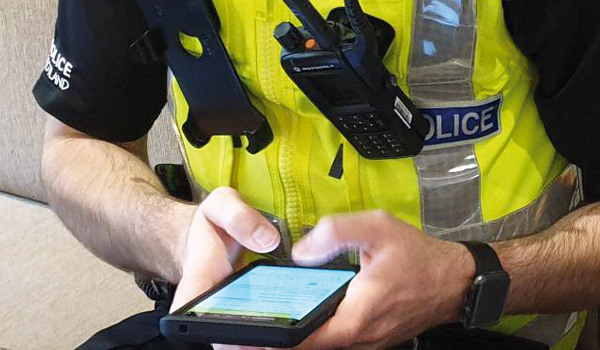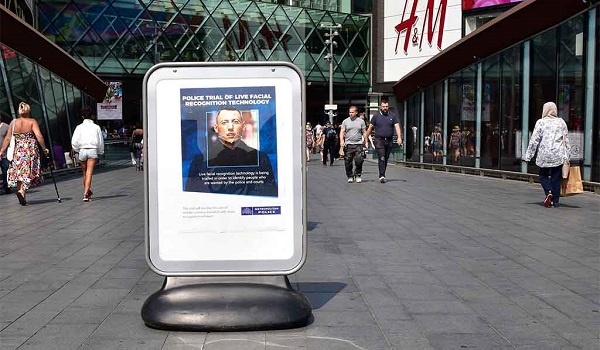Roll-out of mobile devices begins
Police Scotland has achieved a major milestone in its modernisation programme with the introduction of mobile devices that will “positively change” its operational policing approach.
Officers in Dundee, Perth, Kinross and Angus will be among the first in Scotland to start using mobile technology as part of their operational duties.
Ten thousand devices will be issued to officers over the next nine months as part of Police Scotland’s Digital, Data and ICT Strategy, designed to increase productivity and information access.
The mobiles will be loaded with apps enabling officers to carry out checks and file crime reports. Officers will also be able to type statements directly onto the device through the use of Motorola Solutions’ digital notebook function Pronto, which will obtain an electronic signature from victims and witnesses.
Police Scotland says the new mobile devices will mean that every response officer and community policing officer, and those with an operational role, will be able to connect to police systems while working remotely.
It will also help reduce the so-called ‘yo-yo policing’, where officers are continually moving back and forth between the front line and the police station to complete administrative tasks.
This means officers will be able to spend more time working within the community, dealing with incidents, supporting victims and focusing on crime prevention.
They will be able to record data and images in compliance with criminal justice requirements, with information auto-populated in relevant fields in multiple applications and forms to avoid duplication.
Deputy Chief Constable Will Kerr said: “The introduction of mobile technology is a major milestone which will positively change the operational policing approach in Scotland.
“Until now, our officers have been using paper notebooks to record information and crimes and have then been wasting time travelling back to their stations to type that into a computer.
“Giving them mobile phones will make them more visible in the communities they serve, enabling them to work on crime prevention and community-based policing to keep people safe, whether in the public, private or virtual space.
“It’s the start of our work to equip officers with the tools they need to do their jobs and to transform Police Scotland into an organisation capable of delivering 21st century policing, but there’s much more that we still need to do.”
Chief Superintendent Andrew Todd, divisional commander for Tayside, the first division to receive the mobile technology, said: “My officers will now be able to spend more time on patrol, increasing their visibility, engagement and accessibility within the communities they serve.
“Members of the public will see police officers operating their mobile device in public areas. It is important they understand they are not using their personal telephone and that they are working, but be reassured they will always be available to help or provide advice if needed.”
Justice Secretary Humza Yousaf said: “I am pleased that the Scottish government has been able to help Police Scotland invest in this new technology, which will enable officers to work in the heart of Scotland’s communities, providing reassurance and increasing their visibility.
“By utilising updated technology, Scotland’s police service can become even more agile and responsive, ensuring they are better equipped to meet the demands of a modern Scotland. Being able to access information at their fingertips will enhance officers’ ability to react quickly to issues that they encounter while out on the beat, keeping people safe.”
Susan Deacon, chair of the Scottish Police Authority, said it was a “really important and much needed step forward”.
“The introduction of mobile working will bring real benefits to the police and the public and will make the police service more responsive, visible and efficient. Continued investment in technology is vital to ensure that policing in Scotland keeps pace with changing needs and demands. Communities across Scotland will be better protected as a result of these changes,” she added.
Norman Dixon, Motorola Solutions’ account director for Scotland, said: “The Pronto mobile application replaces the paper notebook and modernises police workflows by giving them access to databases and tools on their mobile device on the beat.
“It is a world-leading mobile solution for policing. It was developed here in Scotland in partnership with the police service, so it is fantastic to see that it will become available to 10,000 Police Scotland officers.
“We look forward to working with Police Scotland and are proud to be part of this major milestone in mobile police technology.”
The mobile devices are being rolled out under the £21 million Mobile Working Project, which was part-funded by the Scottish government’s capital budget allocation.
Motorola Solutions was awarded a three-year contract in January for its Pronto digital policing application software as part of a broader deal between Police Scotland and EE, part of BT Group, to deliver the project.
David Wallace, BT’s public sector director in Scotland and chair of the BT board in Scotland, added: “We’re pleased to be leading this project, bringing in our EE mobile network – the largest 4G network in the UK – and our unrivalled resources to help Police Scotland transform the way they work.”
The mobile devices will be further enhanced over time with the addition of future policing applications, including national systems as they become available.
Pronto was originally developed in collaboration with police officers and the Crown Office and Procurator Fiscals Office in the early 2000s as part of a project with the University of Glasgow. The latest version of Pronto is now being used by some 20 police forces and more than 40,000 officers across England, Wales and the Channel Islands.
Motorola Solutions says overall, Pronto has allowed police forces to save between one and two hours of administration and travel time per officer, per shift. It has also enabled significant cost savings.
Last year, Police Scotland produced a business case for a major investment in digital, data and ICT over ten years to modernise the service. The proposed investment would also generate savings and public service improvements for the wider criminal justice system.





